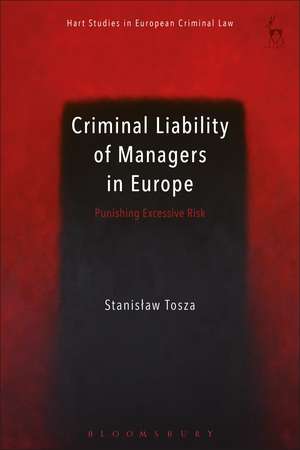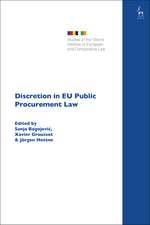Criminal Liability of Managers in Europe: Punishing Excessive Risk: Hart Studies in European Criminal Law
Autor David Weber, Stanislaw Toszaen Limba Engleză Hardback – 26 dec 2018
Din seria Hart Studies in European Criminal Law
-
 Preț: 147.01 lei
Preț: 147.01 lei - 28%
 Preț: 374.46 lei
Preț: 374.46 lei - 22%
 Preț: 264.45 lei
Preț: 264.45 lei -
 Preț: 306.94 lei
Preț: 306.94 lei - 30%
 Preț: 607.18 lei
Preț: 607.18 lei - 30%
 Preț: 567.99 lei
Preț: 567.99 lei - 18%
 Preț: 322.33 lei
Preț: 322.33 lei - 34%
 Preț: 511.97 lei
Preț: 511.97 lei - 18%
 Preț: 322.80 lei
Preț: 322.80 lei - 22%
 Preț: 272.23 lei
Preț: 272.23 lei - 22%
 Preț: 270.57 lei
Preț: 270.57 lei - 18%
 Preț: 322.60 lei
Preț: 322.60 lei - 27%
 Preț: 409.90 lei
Preț: 409.90 lei - 30%
 Preț: 835.93 lei
Preț: 835.93 lei - 22%
 Preț: 257.97 lei
Preț: 257.97 lei - 18%
 Preț: 306.94 lei
Preț: 306.94 lei - 18%
 Preț: 308.74 lei
Preț: 308.74 lei - 18%
 Preț: 306.47 lei
Preț: 306.47 lei - 18%
 Preț: 323.84 lei
Preț: 323.84 lei - 22%
 Preț: 273.06 lei
Preț: 273.06 lei - 18%
 Preț: 300.98 lei
Preț: 300.98 lei - 18%
 Preț: 299.55 lei
Preț: 299.55 lei - 18%
 Preț: 299.01 lei
Preț: 299.01 lei - 28%
 Preț: 466.81 lei
Preț: 466.81 lei
Preț: 571.66 lei
Preț vechi: 817.61 lei
-30% Nou
109.39€ • 114.59$ • 90.66£
Carte tipărită la comandă
Livrare economică 08-22 aprilie
Specificații
ISBN-10: 1509914978
Pagini: 344
Dimensiuni: 156 x 234 x 29 mm
Greutate: 0.66 kg
Editura: Bloomsbury Publishing
Colecția Hart Publishing
Seria Hart Studies in European Criminal Law
Locul publicării:London, United Kingdom
Caracteristici
Notă biografică
Stanislaw Tosza is an assistant professor at the Willem Pompe Institute for Criminal Law and Criminology and a postdoctoral researcher at the Utrecht Centre for Regulation and Enforcement in Europe (RENFORCE), Utrecht University.
Cuprins
1. Introduction1. Financial Crisis and Excessive Risk 2. Business Decisions and Excessive Risk-Taking 3. Excessive Risk-Taking and Criminal Liability 4. Scope and Structure 2. England and Wales1. Introduction and History 2. Protected Legal Interests 3. Main Offences 4. Inchoate Offences 5. Cooperation in the Commission of the Offence 6. Reasons for Excluding Criminal Liability 7. Offence of Reckless Misconduct in the Management of a Financial Institution 8. Solutions to the Five Cases 9. Conclusions 3. France 1. Introduction and History 2. Protected Legal Interests 3. Main Offences 4. Inchoate Offences 5. Cooperation in the Commission of the Offence 6. Reasons for Excluding Criminal Liability 7. Solutions to the Five Cases 8. Conclusions 4. Germany 1. Introduction and History 2. Protected Legal Interests 3. Offence of Untreue 4. Inchoate Offences 5. Cooperation in the Commission of the Offence 6. Reasons for Excluding Criminal Liability 7. Special Provisions for Banking and Insurance Executives 8. Solutions to the Five Cases 9. Conclusions 5. Comparative Analysis 1. Introduction 2. Protected Legal Interests 3. Managers as Possible Perpetrators 4. Exposing to Excessive Risk as Criminal Conduct 5. Mens Rea 6. Special Provisions for Banking and Insurance Executives 7. Comparison of the Results of the Five Cases 8. Conclusions: Models of Criminalisation of Excessive Risk-Taking 6. Criminalisation of Excessive Risk-Taking by Managers? 1. Introduction 2. Justification for Use of Criminal Law and its Limits3. Criminalisation of Excessive Risk-Taking by Managers? 4. Outcome 7. Conclusions 1. Introduction 2. How to Criminalise Excessive Risk-Taking by Managers? 3. Evaluation of the Three National Legal Systems 4. Final Conclusion
Descriere
Every managerial decision is risky, at least to some extent. Conducting business is impossible without venturing into new territories and even the most ordinary daily choices could turn out to be failures. Excessive risk, however, can be very detrimental as was starkly illustrated by the most recent financial crisis.
By criminalising managers' excessive risk-taking criminal law enters a sphere which is at the core of the activity it affects. At the same time it provides for criminal punishment for courses of conduct that, without doubt, can be extremely harmful. The objective of this book is to examine existing criminalisation of excessive risk-taking as well as to analyse whether such criminalisation is desirable and if yes, under which conditions.















